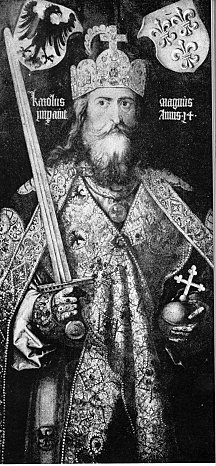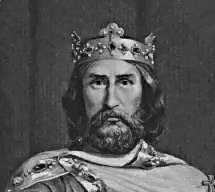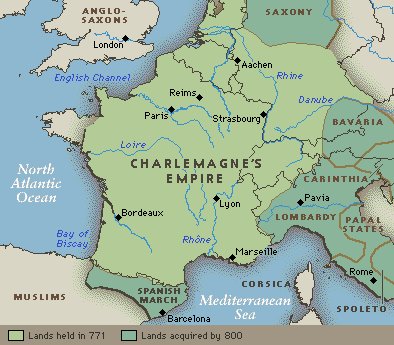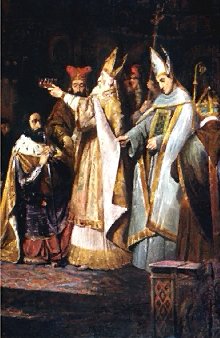
 harlemagne, or
Charles the Great (742-814), grandson of Charles Martel, was
probably brought up at the court of his father, Pepin the Short,
and on his death became king of the Franks, 768, at first jointly
with his brother Carloman. After the latter’s death, 771, he
ruled alone. His long reign of forty-six years was occupied in
waging war against every race that seemed to threaten the empire.
His forces were so overwhelming and so well organized, and his
military and political genius so great, that the enemy rarely
faced him. Charles crossed the Alps, and was soon master of Italy,
the greater part of which he added to his Frankish empire; and in
776, after an unsuccessful revolt by the Lombards, he created
Italy a kingdom, which he conferred on his son Pepin in 781, who
was crowned king of Italy by the Pope. Meantime Charles had his
attention directed to Spain by the troubles among the Saracens,
and in 778 he invaded the peninsula with two armies. In 800, on
the invitation of Pope Leo III, Charles again proceeded to Italy,
and on Christmas Eve was crowned emperor of the Romans; and the
foundation of the political system of the Middle Ages was laid.
The remaining years of his reign were comparatively quiet.
Himself no mean scholar, he welcomed to his court men of learning.
Charlemagne was no recluse, but was fond of sport and hunting. He
died in 814 at Aix-la-Chapelle, where he was buried. Consult
‘Life’ by Eginhard in Latin, in Bibliotheca Rerum
Germanicarum (1873; Eng. trans. by Glaister, 1877); Mombert’s
Charles the Great; Mullinger’s The Schools of
Charles the Great; Wells’ The Age of Charlemagne;
Davis’ Charlemagne, in Heroes of the Nation series.
For his governmental institutions, consult Fustel de Coulange’s
‘Le gouvernement de Charlemagne,’ in Revue des Deux
Mondes; for the literature of the period, Ampère’s Histoire
littéraire de la France sous Charlemagne (2nd ed., 1868);
for arts, Schnaase’s Geschichte der bildenden Künste,
vol. IV (8 vols.); and for romance, Gaston Paris’ Histoire
poétique de Charlemagne. [World Wide Illustrated
Encyclopedia, 1935]
harlemagne, or
Charles the Great (742-814), grandson of Charles Martel, was
probably brought up at the court of his father, Pepin the Short,
and on his death became king of the Franks, 768, at first jointly
with his brother Carloman. After the latter’s death, 771, he
ruled alone. His long reign of forty-six years was occupied in
waging war against every race that seemed to threaten the empire.
His forces were so overwhelming and so well organized, and his
military and political genius so great, that the enemy rarely
faced him. Charles crossed the Alps, and was soon master of Italy,
the greater part of which he added to his Frankish empire; and in
776, after an unsuccessful revolt by the Lombards, he created
Italy a kingdom, which he conferred on his son Pepin in 781, who
was crowned king of Italy by the Pope. Meantime Charles had his
attention directed to Spain by the troubles among the Saracens,
and in 778 he invaded the peninsula with two armies. In 800, on
the invitation of Pope Leo III, Charles again proceeded to Italy,
and on Christmas Eve was crowned emperor of the Romans; and the
foundation of the political system of the Middle Ages was laid.
The remaining years of his reign were comparatively quiet.
Himself no mean scholar, he welcomed to his court men of learning.
Charlemagne was no recluse, but was fond of sport and hunting. He
died in 814 at Aix-la-Chapelle, where he was buried. Consult
‘Life’ by Eginhard in Latin, in Bibliotheca Rerum
Germanicarum (1873; Eng. trans. by Glaister, 1877); Mombert’s
Charles the Great; Mullinger’s The Schools of
Charles the Great; Wells’ The Age of Charlemagne;
Davis’ Charlemagne, in Heroes of the Nation series.
For his governmental institutions, consult Fustel de Coulange’s
‘Le gouvernement de Charlemagne,’ in Revue des Deux
Mondes; for the literature of the period, Ampère’s Histoire
littéraire de la France sous Charlemagne (2nd ed., 1868);
for arts, Schnaase’s Geschichte der bildenden Künste,
vol. IV (8 vols.); and for romance, Gaston Paris’ Histoire
poétique de Charlemagne. [World Wide Illustrated
Encyclopedia, 1935]
Notes on Charlemagne King of the Franks and Roman Emperor
Upon the death of Pepin, the Frankish kingdom was divided
according to custom between his two sons. Relations between the
brothers were cool, but upon the early death of Carloman in 771,
Charles became sole ruler of the Franks and commenced the
brilliant reign which made him "Charles the Great". He
fought the Saxons in 18 campaigns between 772 and 799. Saxon
chiefs were persuaded to be partised and become Charles’
vassals, placing much of Saxony under Frankish control. In 773,
at the request of Pope Adrian I, he crossed the Alps and defeated
the Lombards in Pavia in 774, capturing Desiderius, the last King
of the Lombards, and taking the Lombard crown himself. Between
777 and 801, he conquered Northern Spain despite setbacks such as
the battle of Roncesvalles in 778, where the rearguard of the
Frankish army under Roland, was destroyed by a combination of
Moors and the Christian Basques of Pamplona. In 788, Bavaria was
absorbed into his dominions and he established the eastern mark
of his empire on the R. Raab in Austria. In 800, he marched into
Italy and on Christmas Day 800 he was Crowned by Pope Leo III and
saluted as Carolus Augustus, emperor of the Romans. The remaining
years of his reign were spent consolidating his empire. {Chamber’s
Biographical Dictionary and Encyclopedia of Military History} [GADD.GED]
 Charlemagne, in
Latin Carolus Magnus (Charles the Great) (742-814), king of the
Franks (768-814) and Emperor of the Romans (800-14), who led his
Frankish armies to victory over numerous other peoples and
established his rule in most of western and central Europe. He
was the best-known and most influential king in Europe in the
Middle Ages.
Charlemagne, in
Latin Carolus Magnus (Charles the Great) (742-814), king of the
Franks (768-814) and Emperor of the Romans (800-14), who led his
Frankish armies to victory over numerous other peoples and
established his rule in most of western and central Europe. He
was the best-known and most influential king in Europe in the
Middle Ages.
Early Years
Charlemagne was born probably in Aachen (Aix-la-Chapelle), on
April 2, 742, the son of the Frankish king Pepin the Short and
the grandson of Charles Martel. In 751 Pepin dethroned the last
Merovingian king and assumed the royal title himself. He was
crowned by Pope Stephen II in 754. Besides anointing Pepin, Pope
Stephen anointed both Charlemagne and his younger brother
Carloman.
Within the year Pepin invaded Italy to protect the pope
against the Lombards, and in 756 he again had to rush to the pope's
aid. From 760 on, Pepin's main military efforts went into the
conquest of Aquitaine, the lands south of the Loire River.
Charlemagne accompanied his father on most of these expeditions.
Campaigns
 When Pepin died in 768, the rule of his
realms was to be shared between his two sons. Charlemagne sought
an alliance with the Lombards by marrying (770) the daughter of
their king, Desiderius (reigned 757-774). In 771 Carloman died
suddenly. Charlemagne then seized his territories, but Carloman's
heirs took refuge at the court of Desiderius. By that time
Charlemagne had repudiated his wife, and Desiderius was no longer
friendly. In 772, when Pope Adrian I appealed to Charlemagne for
help against Desiderius, the Frankish king invaded Italy, deposed
his erstwhile father-in-law (774), and himself assumed the royal
title. He then journeyed to Rome and reaffirmed his father's
promise to protect papal lands. As early as 772 Charlemagne had
fought onslaughts of the heathen Saxons on his lands. Buoyed by
his Italian success, he now (775) embarked on a campaign to
conquer and Christianize them. That campaign had some initial
success but was to drag on for 30 years, in which time he
conducted many other campaigns as well. He fought in Spain in 778;
on the return trip his rear guard, led by Roland, was ambushed, a
story immortalized in The Song of Roland. In 788 he
subjected the Bavarians to his rule, and between 791 and 796
Charlemagne's armies conquered the empire of the Avars (corresponding
roughly to modern Hungary and Austria).
When Pepin died in 768, the rule of his
realms was to be shared between his two sons. Charlemagne sought
an alliance with the Lombards by marrying (770) the daughter of
their king, Desiderius (reigned 757-774). In 771 Carloman died
suddenly. Charlemagne then seized his territories, but Carloman's
heirs took refuge at the court of Desiderius. By that time
Charlemagne had repudiated his wife, and Desiderius was no longer
friendly. In 772, when Pope Adrian I appealed to Charlemagne for
help against Desiderius, the Frankish king invaded Italy, deposed
his erstwhile father-in-law (774), and himself assumed the royal
title. He then journeyed to Rome and reaffirmed his father's
promise to protect papal lands. As early as 772 Charlemagne had
fought onslaughts of the heathen Saxons on his lands. Buoyed by
his Italian success, he now (775) embarked on a campaign to
conquer and Christianize them. That campaign had some initial
success but was to drag on for 30 years, in which time he
conducted many other campaigns as well. He fought in Spain in 778;
on the return trip his rear guard, led by Roland, was ambushed, a
story immortalized in The Song of Roland. In 788 he
subjected the Bavarians to his rule, and between 791 and 796
Charlemagne's armies conquered the empire of the Avars (corresponding
roughly to modern Hungary and Austria).
Coronation
 Having thus established
Frankish rule over so many other peoples, Charlemagne had in fact
built an empire and become an emperor. It remained only for him
to add the title. On Christmas Day, in 800, Charlemagne knelt to
pray in Saint Peter's Basilica in Rome. Pope Leo III then placed
a crown upon his head, and the people assembled in the church
acclaimed him the great, pacific emperor of the Romans.
Having thus established
Frankish rule over so many other peoples, Charlemagne had in fact
built an empire and become an emperor. It remained only for him
to add the title. On Christmas Day, in 800, Charlemagne knelt to
pray in Saint Peter's Basilica in Rome. Pope Leo III then placed
a crown upon his head, and the people assembled in the church
acclaimed him the great, pacific emperor of the Romans.
Charlemagne's biographer, Einhard, reported that the king was
surprised by this coronation and that had he known it was going
to happen, he would not have gone into the church that day. This
report has led to much speculation by historians. Charlemagne
probably desired and expected to get the imperial title and he
subsequently used it. In 813 he designated his sole surviving son,
Louis, as his successor, and personally crowned him.
Administration
Charlemagne established a more permanent royal capital than
had any of his predecessors. His favorite residence from 794 on
was at Aix-la-Chapelle. He had a church and a palace constructed
there, based in part on architectural borrowings from Ravenna and
Rome. At his court he gathered scholars from all over Europe, the
most famous being the English cleric Alcuin of York, whom he
placed in charge of the palace school.
Administration of the empire was entrusted to some 250 royal
administrators called counts. Charlemagne issued hundreds of
decrees, called capitularies, dealing with a broad range of
topics from judicial and military matters to monasteries,
education, and the management of royal estates.
The empire did not expand after 800; indeed, already in the
790s the seacoasts and river valleys experienced the first,
dreaded visits of the Vikings. Charlemagne ordered a special
watch against them in every harbor, but with little effect. He
died before their full, destructive force was unleashed on the
empire.
Evaluation
Charlemagne is important not only for the number of his
victories and the size of his empire, but for the special blend
of tradition and innovation that he represented. On the one hand,
he was a traditional Germanic warrior, who spent most of his
adult life fighting. In the Saxon campaigns he imposed baptism by
the sword, and he retaliated against rebels with merciless
slaughter. On the other hand, he placed his immense power and
prestige at the service of Christian doctrine, the monastic life,
the teaching of Latin, the copying of books, and the rule of law.
His life, held up as a model to most later kings, thus embodied
the fusion of Germanic, Roman, and Christian cultures that became
the basis of European civilization.
Contributed By: Lester K. Little [Microsoft Encarta 98
Encyclopedia]
 Back
Back

 harlemagne, or
Charles the Great (742-814), grandson of Charles Martel, was
probably brought up at the court of his father, Pepin the Short,
and on his death became king of the Franks, 768, at first jointly
with his brother Carloman. After the latter’s death, 771, he
ruled alone. His long reign of forty-six years was occupied in
waging war against every race that seemed to threaten the empire.
His forces were so overwhelming and so well organized, and his
military and political genius so great, that the enemy rarely
faced him. Charles crossed the Alps, and was soon master of Italy,
the greater part of which he added to his Frankish empire; and in
776, after an unsuccessful revolt by the Lombards, he created
Italy a kingdom, which he conferred on his son Pepin in 781, who
was crowned king of Italy by the Pope. Meantime Charles had his
attention directed to Spain by the troubles among the Saracens,
and in 778 he invaded the peninsula with two armies. In 800, on
the invitation of Pope Leo III, Charles again proceeded to Italy,
and on Christmas Eve was crowned emperor of the Romans; and the
foundation of the political system of the Middle Ages was laid.
The remaining years of his reign were comparatively quiet.
Himself no mean scholar, he welcomed to his court men of learning.
Charlemagne was no recluse, but was fond of sport and hunting. He
died in 814 at Aix-la-Chapelle, where he was buried. Consult
‘Life’ by Eginhard in Latin, in Bibliotheca Rerum
Germanicarum (1873; Eng. trans. by Glaister, 1877); Mombert’s
Charles the Great; Mullinger’s The Schools of
Charles the Great; Wells’ The Age of Charlemagne;
Davis’ Charlemagne, in Heroes of the Nation series.
For his governmental institutions, consult Fustel de Coulange’s
‘Le gouvernement de Charlemagne,’ in Revue des Deux
Mondes; for the literature of the period, Ampère’s Histoire
littéraire de la France sous Charlemagne (2nd ed., 1868);
for arts, Schnaase’s Geschichte der bildenden Künste,
vol. IV (8 vols.); and for romance, Gaston Paris’ Histoire
poétique de Charlemagne. [World Wide Illustrated
Encyclopedia, 1935]
harlemagne, or
Charles the Great (742-814), grandson of Charles Martel, was
probably brought up at the court of his father, Pepin the Short,
and on his death became king of the Franks, 768, at first jointly
with his brother Carloman. After the latter’s death, 771, he
ruled alone. His long reign of forty-six years was occupied in
waging war against every race that seemed to threaten the empire.
His forces were so overwhelming and so well organized, and his
military and political genius so great, that the enemy rarely
faced him. Charles crossed the Alps, and was soon master of Italy,
the greater part of which he added to his Frankish empire; and in
776, after an unsuccessful revolt by the Lombards, he created
Italy a kingdom, which he conferred on his son Pepin in 781, who
was crowned king of Italy by the Pope. Meantime Charles had his
attention directed to Spain by the troubles among the Saracens,
and in 778 he invaded the peninsula with two armies. In 800, on
the invitation of Pope Leo III, Charles again proceeded to Italy,
and on Christmas Eve was crowned emperor of the Romans; and the
foundation of the political system of the Middle Ages was laid.
The remaining years of his reign were comparatively quiet.
Himself no mean scholar, he welcomed to his court men of learning.
Charlemagne was no recluse, but was fond of sport and hunting. He
died in 814 at Aix-la-Chapelle, where he was buried. Consult
‘Life’ by Eginhard in Latin, in Bibliotheca Rerum
Germanicarum (1873; Eng. trans. by Glaister, 1877); Mombert’s
Charles the Great; Mullinger’s The Schools of
Charles the Great; Wells’ The Age of Charlemagne;
Davis’ Charlemagne, in Heroes of the Nation series.
For his governmental institutions, consult Fustel de Coulange’s
‘Le gouvernement de Charlemagne,’ in Revue des Deux
Mondes; for the literature of the period, Ampère’s Histoire
littéraire de la France sous Charlemagne (2nd ed., 1868);
for arts, Schnaase’s Geschichte der bildenden Künste,
vol. IV (8 vols.); and for romance, Gaston Paris’ Histoire
poétique de Charlemagne. [World Wide Illustrated
Encyclopedia, 1935] Charlemagne, in
Latin Carolus Magnus (Charles the Great) (742-814), king of the
Franks (768-814) and Emperor of the Romans (800-14), who led his
Frankish armies to victory over numerous other peoples and
established his rule in most of western and central Europe. He
was the best-known and most influential king in Europe in the
Middle Ages.
Charlemagne, in
Latin Carolus Magnus (Charles the Great) (742-814), king of the
Franks (768-814) and Emperor of the Romans (800-14), who led his
Frankish armies to victory over numerous other peoples and
established his rule in most of western and central Europe. He
was the best-known and most influential king in Europe in the
Middle Ages. When Pepin died in 768, the rule of his
realms was to be shared between his two sons. Charlemagne sought
an alliance with the Lombards by marrying (770) the daughter of
their king, Desiderius (reigned 757-774). In 771 Carloman died
suddenly. Charlemagne then seized his territories, but Carloman's
heirs took refuge at the court of Desiderius. By that time
Charlemagne had repudiated his wife, and Desiderius was no longer
friendly. In 772, when Pope Adrian I appealed to Charlemagne for
help against Desiderius, the Frankish king invaded Italy, deposed
his erstwhile father-in-law (774), and himself assumed the royal
title. He then journeyed to Rome and reaffirmed his father's
promise to protect papal lands. As early as 772 Charlemagne had
fought onslaughts of the heathen Saxons on his lands. Buoyed by
his Italian success, he now (775) embarked on a campaign to
conquer and Christianize them. That campaign had some initial
success but was to drag on for 30 years, in which time he
conducted many other campaigns as well. He fought in Spain in 778;
on the return trip his rear guard, led by Roland, was ambushed, a
story immortalized in The Song of Roland. In 788 he
subjected the Bavarians to his rule, and between 791 and 796
Charlemagne's armies conquered the empire of the Avars (corresponding
roughly to modern Hungary and Austria).
When Pepin died in 768, the rule of his
realms was to be shared between his two sons. Charlemagne sought
an alliance with the Lombards by marrying (770) the daughter of
their king, Desiderius (reigned 757-774). In 771 Carloman died
suddenly. Charlemagne then seized his territories, but Carloman's
heirs took refuge at the court of Desiderius. By that time
Charlemagne had repudiated his wife, and Desiderius was no longer
friendly. In 772, when Pope Adrian I appealed to Charlemagne for
help against Desiderius, the Frankish king invaded Italy, deposed
his erstwhile father-in-law (774), and himself assumed the royal
title. He then journeyed to Rome and reaffirmed his father's
promise to protect papal lands. As early as 772 Charlemagne had
fought onslaughts of the heathen Saxons on his lands. Buoyed by
his Italian success, he now (775) embarked on a campaign to
conquer and Christianize them. That campaign had some initial
success but was to drag on for 30 years, in which time he
conducted many other campaigns as well. He fought in Spain in 778;
on the return trip his rear guard, led by Roland, was ambushed, a
story immortalized in The Song of Roland. In 788 he
subjected the Bavarians to his rule, and between 791 and 796
Charlemagne's armies conquered the empire of the Avars (corresponding
roughly to modern Hungary and Austria). Having thus established
Frankish rule over so many other peoples, Charlemagne had in fact
built an empire and become an emperor. It remained only for him
to add the title. On Christmas Day, in 800, Charlemagne knelt to
pray in Saint Peter's Basilica in Rome. Pope Leo III then placed
a crown upon his head, and the people assembled in the church
acclaimed him the great, pacific emperor of the Romans.
Having thus established
Frankish rule over so many other peoples, Charlemagne had in fact
built an empire and become an emperor. It remained only for him
to add the title. On Christmas Day, in 800, Charlemagne knelt to
pray in Saint Peter's Basilica in Rome. Pope Leo III then placed
a crown upon his head, and the people assembled in the church
acclaimed him the great, pacific emperor of the Romans.